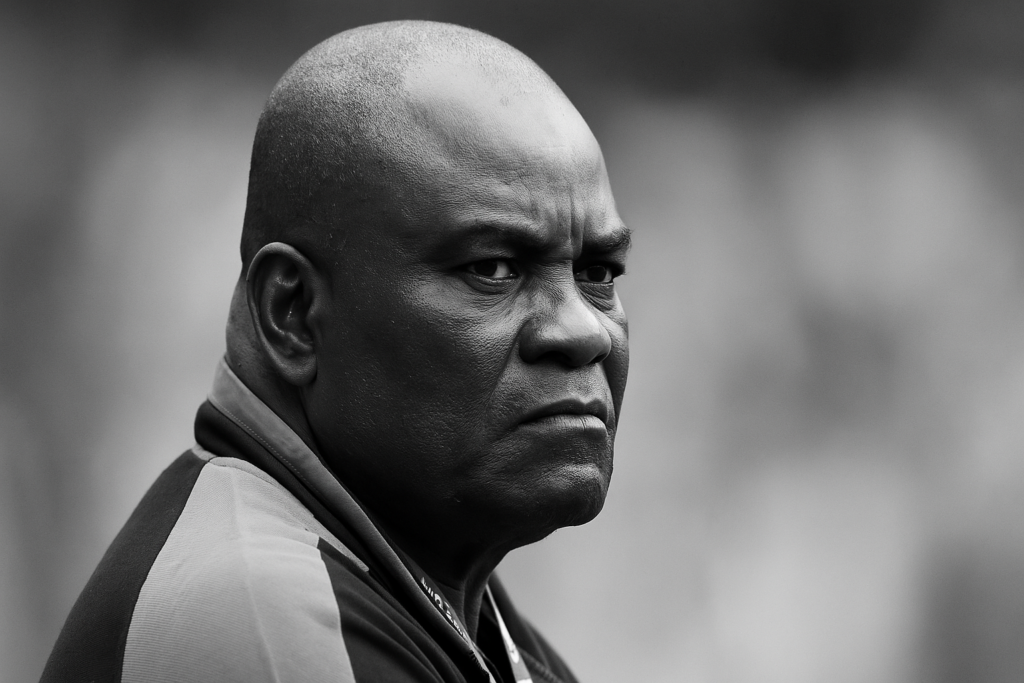Christian Chukwu, the iconic footballer who captained Nigeria to its first Africa Cup of Nations (AFCON) title in 1980 and later served as head coach of the Super Eagles, has died at 74.
The Nigerian Football Federation (NFF) confirmed that Chukwu died in the early hours of Saturday at his residence in Enugu, his home state in southeastern Nigeria. The cause of death has not been officially disclosed.
During his illustrious playing career as a commanding defender for the Green Eagles, Christian Chukwu — fondly known as “Chairman” — shared the pitch with some of Nigeria’s most iconic footballers, including Segun Odegbami, Muda Lawal, Adokiye Amesiemaka, Emmanuel Okala, and Best Ogedegbe. His influence on Nigerian football spanned more than five decades, from his dominance at the heart of Enugu Rangers’ defense in the 1970s to his pivotal leadership roles with the national team, both as captain and later as head coach.
Chukw on Pitch during on of Nigeria international competition match, source: Tribune Nigeria
A National Icon on and off the Pitch
Born on January 4, 1951, in Enugu, Chukwu began his career with Rangers International FC, where he quickly rose to prominence as a commanding presence in defence. In 1980, as captain of the Green Eagles (now Super Eagles), he led Nigeria to its historic first AFCON title, defeating Algeria in the final.
Former Super Eagles coach ON Pitch, source: Tribune Nigeria
Chukwu would later transition into coaching, where he continued to shape the sport in Nigeria. After serving as an assistant coach during the 1994 World Cup — Nigeria’s first appearance in the global tournament — he was appointed head coach of the national team in 2002.
Under his guidance, the Super Eagles secured a third-place finish at the 2004 AFCON in Tunisia. However, his tenure was not without challenges.
Chukwu was vocal about the treatment of indigenous coaches by the NFF. In a 2024 interview with Athletic Nigeria, he revealed that he was still owed unpaid salaries nearly two decades after his dismissal in 2005.
“They don’t owe foreign coaches, but they owe Nigerian coaches,” Chukwu said. “Some of them are no longer alive, and their dues were never paid. My files are still there at the NFF.”
His criticisms sparked renewed conversations in Nigerian football circles about the perceived bias toward foreign hires and the systemic marginalization of local talent.
Chukwu’s coaching style emphasized discipline, unity, and belief in homegrown players. He was known for building team spirit and trusting local talent at a time when foreign coaches were often preferred.
“Nigerian coaches can perform even better than foreign ones — but our federation doesn’t respect them,” he once said, praising fellow Nigerian coach Augustine Eguavoen during the 2022 AFCON campaign.
After his national team tenure, Chukwu remained a guiding presence in Nigerian football, mentoring young coaches and serving as a respected elder statesman of the sport. In 2021, the Nigeria Football Federation celebrated his 70th birthday, honouring him for his lifelong service to football in the country.
Chukwu’s football journey began in the 1970s with Rangers International FC, where he played a pivotal role in the club’s dominance in national competitions. His leadership on the pitch reached its peak in 1980, when he captained Nigeria to its first-ever Africa Cup of Nations (AFCON) title — a historic achievement that cemented his status as a national icon.
He later joined the coaching staff of the national team and served as assistant coach during Nigeria’s first appearance at the FIFA World Cup in 1994. By 2002, he had become the head coach of the Super Eagles, leading the team to a third-place finish at the 2004 AFCON in Tunisia. His time as head coach came to an end in 2005, but his influence on Nigerian football endured.
In 2019, Chukwu publicly battled health challenges and received support from prominent figures, including a $50,000 donation for treatment from philanthropist Femi Otedola. His health improved in the years that followed, but on April 2024, he passed away in his hometown of Enugu at the age of 74, leaving behind a legacy deeply woven into the fabric of African football.
Tributes Pour In for Christian Chukwu, Nigerian Football Icon
Tributes have come in from across Nigeria and the African football community. Lagos State Governor Babajide Sanwo-Olu described Chukwu’s passing as a “painful loss to the country,” while Enugu State Governor Peter Mbah called it “a personal loss to Ndi Enugu and the entire nation.”
“He was a field marshal and phenomenon,” Mbah said. “His legacy reaches far beyond the pitch.”
Former players, including Adegboye Onigbinde and Mutiu Adepoju, hailed Chukwu as a mentor and leader whose impact will never be forgotten.
“Every player loved to associate with him,” Adepoju said. “He was respected, humble, and deeply loved.”
Christian Chukwu’s passing marks the end of an era in Nigerian football. He will be remembered not only for his victories but for his advocacy, humility, and steadfast belief in Nigerian excellence. In life and in death, he remains one of the greatest names in African football history.
Read Also:Former Super Eagles coach Christian Chukwu is dead
Read Also: NFF unveils Eric Chelle as Super Eagles Head Coach

